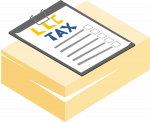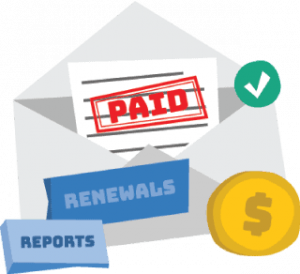Vermont LLC Taxes
Vermont LLCs are taxed as pass-through entities by default, meaning the LLC itself does not pay taxes directly, but instead passes its profits on to its members. Members of the LLC then pay the state’s graduated personal income tax rate that ranges from 3.35% to 8.75%. Any member of the LLC must also pay the 15.3% federal self-employment tax rate (12.4% for social security and 2.9% for Medicare). For LLCs that have C-corp tax election, they’ll have to pay the state’s corporate income tax rate. In our Vermont LLC taxes guide, you’ll learn what you need to know to run your business.
In this article, we’ll cover:


How Are Vermont LLCs Taxed?
One member Vermont LLCs are treated as single-member LLCs (SMLLC) and file taxes as sole proprietorships. On the other hand, LLCs with multiple members file as multi-member LLCs with partnership status. Here are the IRS tax forms you can expect to file as an LLC owner:
- Single-member LLC—Form 1040 (usually Schedule C, but some SMLLCsfile C-EZ, E, or F)
- Multi-member LLC—Form 1065
You also have the option of having your LLC taxed as an S-corp or C-corp. Below, we get into what all of that means for you and your business.
Vermont LLCs taxed as S-corp
If your LLC meets the IRS requirements for S-corps, you may consider having your LLC file under S-corp status. S-corps are not subject to corporate income tax and avoid paying the 15.3% self-employment tax LLCs normally pay on dividends. You also get to keep your LLC’s pass-through status as an S-corp.
You can apply for S-corp tax status by filing Form 2553 with the IRS. S-corp status is a tax election available to both LLCs and corporations. Be sure to consult with a CPA before changing your LLC’s tax status. To file your LLC’s taxes as an S-corp, you’ll submit Form 1120-S.
Vermont LLCs taxed as C-corp
Though it is not as common as LLCs filing as S-corps, you can have your LLC taxed at the default status of a corporation—C-corp status. As always, speak with a tax professional before you change your LLC’s tax classification. C-corps are subject to double taxation and must pay taxes once at the corporate level and again at the shareholder level. C-corp LLCs are, however, eligible for more tax deductions and are more attractive to investors.
As an LLC filing under C-corp status, you will have to pay the 21% federal corporate income tax along with Vermont’s corporate income tax that ranges from 6% to 8.50%. To file your taxes with the IRS as a C-corp, you’ll need to submit Form 1120.

Vermont State Income Tax
LLCs filing under their default status pay Vermont’s individual income tax rate based on taxable income. Vermont provides a break down of its rate fees on their 2021 Vermont Tax Rate Schedules chart. Vermont’s individual income tax rate is graduated with rates ranging from 3.35% to 8.75% depending on how you file your individual taxes (single, head of household, or joint). You’ll submit Form BI-471 to pay your LLC’s taxes if it files with default, partnership, or S-corp status.
LLCs with S-corp status or filing as partnerships pay Vermont’s business entity income tax with a minimum fee of $250 every year on top of having to pay individual income taxes. C-corp LLCs pay a graduated tax rate ranging from 6% to 8.50% that breaks down like…
|
Vermont Net Income |
Tax Rate |
| $10,000 or less | 6% |
| $10,001 to $25,000 | $600 plus 7.0% of excess over $10,000 |
| $25,001 and over | $1,650 plus 8.50% of excess over $25,000 |
To file your C-corp LLC’s taxes, submit Form CO-411 to the Vermont Department of Taxes. Some C-corp LLCs must also pay a Gross Receipts Tax with the minimum payments breaking down like such…
|
Vermont Gross Receipts |
Minimum Tax |
| $2,000,000 or less | $300 |
| $2,000,001 – $5,000,000 | $500 |
| $5,000,001 and over | $750 |

Sales and Use Tax
Vermont requires all businesses that sell tangible personal property in Vermont to collect and charge sales tax at the rate of 6%. Vermont’s use tax is 6% for businesses that don’t register to charge sales tax, like online retailers located outside of Vermont. To collect sales tax, you’ll need to register for a Vermont Business Tax Account online and apply for a license. Local municipalities are able to levy a 1% sales tax on businesses you pay on top of the state’s sales tax. To file your Sales and Use Tax Return, submit Form SUT-451.

Local Vermont Taxes
The Vermont Secretary of State allows towns and cities to apply their own sales tax and business personal property taxes. Some municipalities also charge a 9% tax for prepared meals, hotel rooms, and a 10% tax for serving alcoholic beverages. You’ll need to check with your local municipality or county clerk for what taxes your business may owe at the local level. For example, in Burlington, you’ll need to pay a Business Personal Property Tax based on an appraisal of business assets and a 1% sales tax.

Other Taxes in Vermont
Here are some other Vermont taxes that may affect your LLC.
Vermont State Employer Taxes
Most Vermont LLCs with employees will need to pay for unemployment insurance and workers’ compensation insurance.
- Unemployment Premium (UI) Tax—In Vermont, unemployment insurance (UI) is required by law. Vermont bases your unemployment insurance rate on your experience as an employer. New employers pay an unemployment tax rate of 1% usually.
- Workers’ Compensation—Workers’ compensation insurance covers anything your business may be liable for in the case of an employee injured on the job. Most employers in Vermont are required to obtain workers’ compensation insurance. You can purchase workers’ compensation insurance through a private insurer. Your rates will depend on location, number of employees, and other factors.
To learn more about Vermont employer taxes, visit the Vermont Department of Labor website and read Vermont’s Employer Information Manual.
Industry Taxes
The Vermont Department of Taxes also collects taxes on certain industries and professions. Some of the taxes include:
- Alcoholic Beverage Tax
- Bank Franchise Tax
- Cannabis Excise Tax
- Fuel Tax
- Malt and Vinous Beverage Tax
- Meals and Rooms Tax
- Solid Waste Tax
- Uniform Capacity Tax
Find more information on industry taxes on the Vermont Department of Taxes’ Business Taxes page.

Do foreign LLCs in Vermont need to pay Vermont taxes?
Yes. Vermont foreign LLCs (LLCs formed outside of Vermont) are taxed the same as domestic LLCs. Except when it comes to the state’s unemployment insurance tax rate, which is levied at the average in their area. You will also have to pay state and local taxes if you set up a physical location in Vermont.





